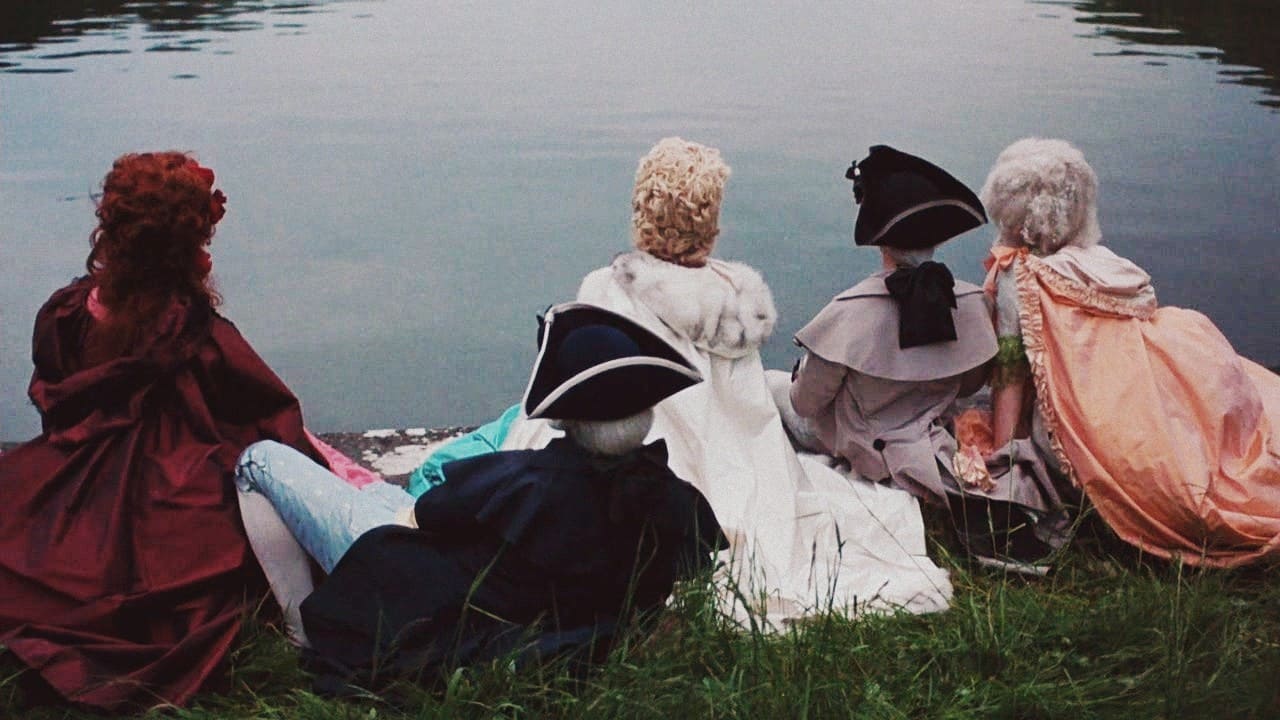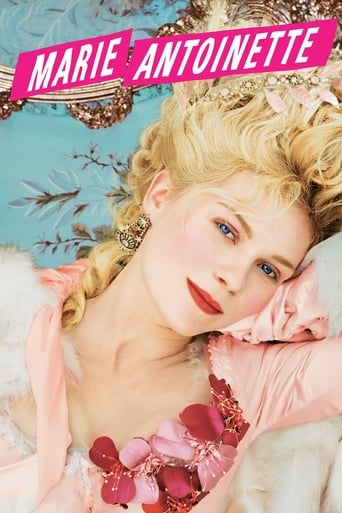

I have seen this movie for second time on tv and again couldn't find anything wrong with it. I consider myself a cinefil, regarding number of movies of different kinds I've seen in my life so far. Someone here wrote, this movie will get more appreciated in the future. I agree. Don't understand negative reviews about historical inaccuracies if French education association awarded the movie. Also, you often have documentaries on the subject on tv, if you want. There I found out, that king demanded all of the aristocracy to move to Versailles after it was built, to surround the king and entertain him. Maybe this also contributed to revolution, if this remained the case 100 years later, because the "upper management" was removed from different parts of France and maybe this also showed in economy? Just my thought.. From first time I have seen this movie, I remembered especially the excellent dinner scene at the end, when royals were dinning in mortal silence, still following court protocol, while the angry mob on the other side of windows was shouting for their heads. It makes you relate to that moment in history, how the disliked couple must have felt..The modern soundtrack is very innovative approach and probably also brought more youth to the cinemas to see historic drama. The birthday party scene stands out. Kirsten Dunst is lovely and witty with her facial expressions in this role. She should have received some awards for it. She's shown also in Fargo she's an interesting actress..Pitty Sophia Coppola doesn't make more movies, I very much liked Lost With Translation as well.
... View MoreI am a huge fan of Sofia Coppola's movie the virgin suicides and so I thought surely this would be an amazing movie. No. It wasn't terrible but it lacked a lot. It didn't really dive into much of the history of Marie Antoinette and it didn't deliver the full story at the end either which was disappointing. If I watch a movie based on a historical event, I want to see the key points of the story unfolded. This movie focuses mainly on their marriage and the rumor of the couple remaining abstinent for the first seven years of their marriage and it focuses a lot on the queen's spending and gambling problems and her party lifestyle. It needed so much more to complete the story!
... View MoreOne of the few responsibilities of Queen Marie Antoinette sees her made to pose, abide by tradition and simper as she decorates war heroes with flowery laurels and allows them the unique privilege of bowing in her presence and giving tribute to their gracious rulers. Usually there's two ways to go about a period piece like this: you take it on with complete sincerity, you ask the actors to speak with the appropriate accent (which is never American), and maybe you win a few Oscars. Or you could attack the source itself and make a mockery of this posturing; history was never as genteel and refined as it is in the movies, so why pretend? The aforementioned scene is a perfect opportunity for the latter, given the frivolous nature of her role in these proceedings. Instead it's the setup for her later affair with the dashing Axel Fersen - they feel a connection at first glance, and later make googly eyes at each other over the table. It's like high school all over again. Marie Antoinette, Sofia Coppola posits, was not that much different than your average teenager of today, and has the immaturity and lack of self-awareness to match. She starts trends (clapping at the theatre) and then later is astounded that she's no longer 'in', her flash in the pan popularity a thing of the past. She brushes off the local gossip as if her status is impervious to its slander. Watching the film is like walking into a giant box of Ladurée macarons, with the pale pastel colours turned to eleven, and giants hands to give it a good shake. Certain sections wouldn't be out of place in a music video, with its giggly irony, bundled anachronisms and the rebellious streak of Bow Wow Wow and The Strokes. It's not just a phase.Simultaneously Coppola wants to draw out the existential angst of being imprisoned by the materialism of the royal position, but there's little desperation or awareness under the surface. Her life is portrayed as one of fanciful bliss, naivety and ignorance of the political and social turmoil that swept her country at the time. This premise of juvenile insularity and stylistic extravagance to match it might have worked as a short film, with some well-directed irony and a thunderclap of a denouement. But Coppola insists on drawing it out over two hours, in which the historical timeline ticks on but Dunst gains no extra wisdom or insight. Coppola tries to find cruel inhumanity beneath the lavish artifice; see the initial procedures Marie Antoinette undergoes, brutally 'stripped' of her Austrian roots, her femininity revoked, her role reduced to an asset instead of a woman. But observe how fragile the film's treatment of this process is, and how delicately the camera is sure to respect Dunst's no-nudity clause. Compare this to a film like The Scarlet Empress, where Marlene Dietrich's wide-eyed Sophia is groped and inspected like a package upon arrival in Moscow, only for her to later rise from the ashes and become a powerhouse. There's no phoenix rebirth here - Coppola's more concerned about Dunst losing her puppy instead of her identity and childhood. This is typical of much of Sofia Copppola's films, so intent on uncovering the humanity behind the rich and privileged that they gain tunnel vision and forget about everyone else, and forgo sympathy for their cause (given her past, it's a deeply personal concern). The film conveniently avoids elaborating on the rest of her life - the struggles of motherhood and losing her children young, her gradual push into the political court, urging her husband to take on the revolutionaries - because that would invalidate her little fantasy. Dunst is as good as this vision allows her, callow and casually American in a French court. Schwartzman has the same accent but is more intriguing as the young king thrust onto the throne and made to learn on the go. His timid, laconic performance is quietly subversive of the real Louis XVI: you can imagine God proclaiming divine right in one of Schwartzman's dreams, only for him to ask, "Are you sure?"If Coppola was a little braver she might have gone for the jugular and shown her execution, utilise it as a violent counterpoint to Marie Antoinette's self-contained fantasy. But even delivering consequence the film is revising history, softening events, letting characters off the hook. Recall how every beat in Kubrick's Barry Lyndon is staged to poke fun at the logic and sheen of his imagined historical epic (the unmade Napoleon), and then you will see how little self-awareness Marie Antoinette has in comparison. It positions itself as ironic, but in reality it is as shallow as its eponymous heroine.On the morning of the 5th of October 1789, an angry mob stormed the royal palace of Versailles, mounted two of the guards' heads on pikes, and gathered under the King's quarters. They called for justice, for bread, for the royal family to be placed under political arrest. The king comes out onto the balcony to attempt to bargain, and afterwards they call for the Queen. She answers their call, coming out with her eldest son Louis Joseph, but they want her alone - perhaps the sight of children threatened to satiate their bloodlust. So she bares the full fury of the mob alone, and in a remarkable and inexplicable performance, she calms them. Now they cry, "Vive la Reine! Long live the queen!" Now, isn't this infinitely more interesting than a giggly, infantile schoolgirl?
... View MoreI was about to finish Stefan Zweig's biography novel about Marie Antoinette before watching this movie. %100 director got inspiration from that novel.What a sad story. Young girl from Austria royal made marriage to cut hostility between Austria and France. Anyway every aspect was directly quotation from the book that I mentioned before. I suggest the watchers who want to see this movie, they need to read great novel of Stefan Zweig who was the best autobiographer of 20s Centuries novel name: Marie Antoinette: The Portrait of an Average Woman. She was really average woman,like we are:)
... View More